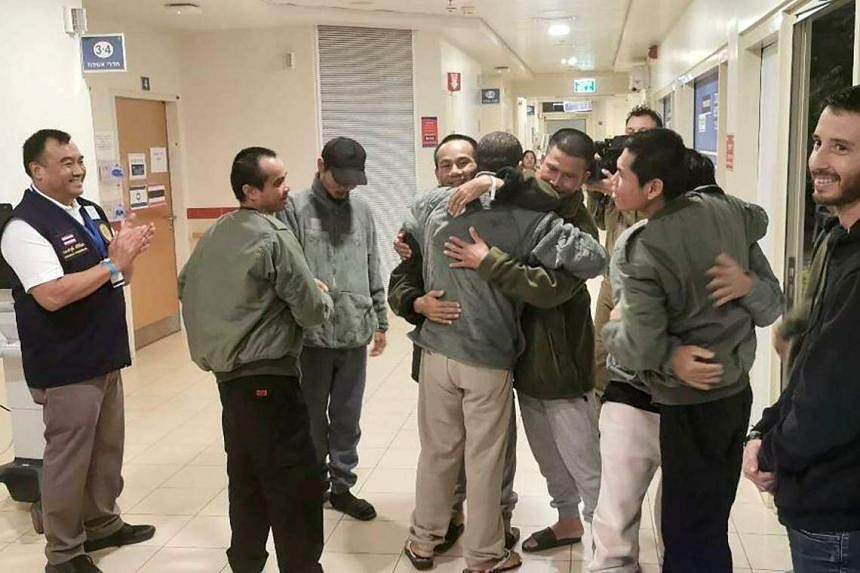BANGKOK – Mr Kongpana Sudlamai has had sleepless nights for nearly two months, anxiously waiting for news about his son, who was among the hundreds abducted in Israel by militant group Hamas in October.
On Nov 26, the 52-year-old was restless again, but this time out of excitement upon learning that his son, Mr Phonsawan Pinakalo, 30, had been released.
“Miracles really do happen,” he said in a social media post.
“I have been waiting for good news. At first, I thought my son already died since they found so many bodies,” he told The Straits Times, adding that he received a call at 3am (Bangkok time) from Thai officials.
“I was so happy, I couldn’t sleep,” he added.
His son is among a third batch of hostages – 17 of them – transferred from Gaza as part of a temporary truce between Hamas and Israel.
So far, Hamas has released 58 hostages under a four-day ceasefire deal agreed by the two sides that began on Nov 24.
On Nov 26, the third day of the truce, three Thai nationals, 13 Israelis and one Russian were freed in exchange for 39 Palestinians, according to officials and Palestinian media.
On Nov 27, Thai Premier Srettha Thavisin said on social media platform X that the three Thais are in good health.
Altogether, 17 Thai nationals who were freed by Hamas have been named.
Foreign Minister Parnpree Bahiddha-Nukara is scheduled to travel to Israel to bring them home on Nov 30. Mr Parnpree, who is also Deputy Prime Minister, will also visit three Thai nationals who are injured and hospitalised, and the Thai community in Israel.
“For the remaining 15 Thai hostages, the... government continues to exert all efforts towards their safe release at the earliest opportunity,” said the Thai Foreign Ministry.
Pictures released by the ministry show the freed Thai nationals receiving medical care, as well as embracing one another at Shamir Medical Centre in Israel.

Mr Kongpana said he has not had the chance to speak with his son, as the latter is undergoing 48-hour medical observation.
About 240 people from 40 countries were captured on Oct 7 when Hamas fighters attacked southern Israel. There were at least 30 Thai nationals, making up the single largest group of foreigners among the hostages.
According to the Thai authorities, at least 39 Thais were killed and 19 injured in the attack, which also targeted farming villages near the Gaza Strip where thousands of Thai nationals work.
The unprecedented attack that killed about 1,200 people has resulted in an escalation of violence in the long-running Israel-Palestinian conflict. Israel has declared war on Hamas, launching a counter-offensive in the Gaza Strip.
Mr Kongpana said that on Oct 7, his son, a tractor driver at a farm less than 4km from the Gaza border, had a day off from work. The duo, who are from Nakhon Ratchasima in Thailand’s north-east, had a short video call that morning.
“He said he heard gunshots, which was unusual for the farm area,” added Mr Kongpana. His son and others took shelter in a bunker for a few hours. But by the afternoon, Mr Phonsawan was uncontactable.

Like many other Thai nationals, Mr Phonsawan had gone to work in Israel’s agricultural sector for better wages, about four years ago. The basic salary of a farmhand in Israel can be at least four times the 15,000 baht (S$570) earned in Thailand for a similar job.
Before the Oct 7 attack, there were about 30,000 Thai nationals working in Israel, with the majority linked to farms and orchards, including areas close to Gaza.
While nearly 8,000 have been repatriated since the outbreak of war, many more have chosen to stay on despite safety concerns.


